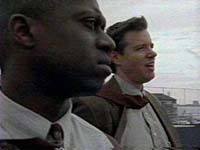The midpoint for a year is at the beginning of July, but the midpoint for the cinematic year is somewhere toward the middle or end of August. Over the past decade, the segmentation of the movie-release calendar has become increasingly rigid. You might say the year starts in Spring, and it’s during this time that we get what are essentially warm-ups to the summer blockbuster season. Movies like Hellboy, The Matrix or Sahara that have the surface of a blockbuster but aren’t expected to have the same truly massive appeal get released here (sometimes, in cases like the The Matrix, with surprising success), as do a few (usually middling) comedies hoping to cash in on the spring break crowds. Often, you'll also see some rather terrible "family" movies on the level of The Pacifier.
From the beginning of May through the first or second week of August, the summer movie season kicks in with high octane, high budget films designed primarily to entertain as well as a few A-list star comedies. Superhero films, sequels, large-budget animated films, broad comedies starring Julia Roberts, Reese Witherspoon or any of the new gay mafia all get slotted into these months. You can usually tell the end of the season by the release of some sort of trashy, gleefully awful action/horror genre film: Aliens vs. Predator, Freddy vs. Jason, Event Horizon, and this year, Snakes on a Plane.
Early fall through Thanksgiving sees medium sized films with a quirkier, ostensibly more intelligent pedigree: This year we’ll see The Children of Men, The Departed, The Fountain, The Science of Sleep, and The Prestige, among others. Previous years have seen movies like Fight Club, Being John Malkovitch, The Squid and the Whale, and History of Violence, to name a few.
Around Thanksgiving, you’ll start to see winter blockbusters, which tend to be somewhat more serious than their summer counterparts, or at least try to appear that way. These days, due primarily to the success of the Lord of the Rings movies, this is the slot for epic fantasy pictures. If you live in a major metro area, you’ll also start to see prestige pictures vying for Oscar glory, serious movies that declare themselves important and noteworthy, whether or not they really are.
And then, finally, during the post-Christmas Oscar season, Hollywood pretty much gives up on new films in preparation for the Academy Awards. They dump their worst pictures into movie theaters during January and February while spending most of their time managing Oscar campaigns and dealing with expanding the theater counts of their limited-release prestige pictures. This can be an interesting time if you don’t live in a city with a strong film scene, as you'll finally see a lot of the buzz pictures that opened in larger areas during the end of the Christmas season (living in Florida, for example, I didn't see Million Dollar Baby till mid-February), but otherwise, it’s the dregs.
That said, this being about the midpoint of the cinematic year, I figured I’d post my favorite films from 2006 so far. I’ve seen most of the movies I’ve been interested in, though I did manage to miss Sympathy for Lady Vengeance, Cars, Lady in the Water, Wordplay, and Shadowboxer, as well as a few others that I’m probably forgetting right now. I can pretty much guarantee this list will change, especially since the movie that I’d probably put at the top of the list won’t be out in theaters for another month, and therefore doesn’t quite fit. And, of course, the rankings here are subject to change at any time. I suspect, in fact, that very few of these films will make my year end list, seeing as how bottom heavy the 2006 movie calendar is. Still, for what it’s worth, here's the list (roughly arranged by preference):
1. Little Miss Sunshine
2. The Descent
3. Inside Man
4. Down in the Valley
5. Miami Vice
6. A Scanner Darkly
7. District B13
8. Brick
9. Cache
10. Night Watch
11. Thank You for Smoking
12. Mission: Impossible 3










